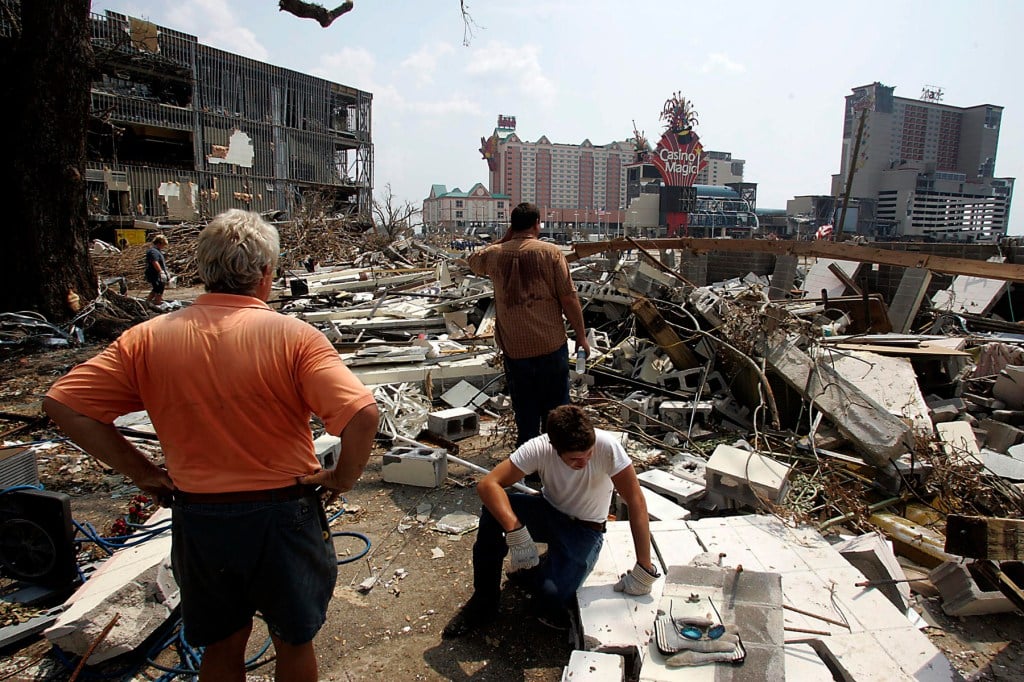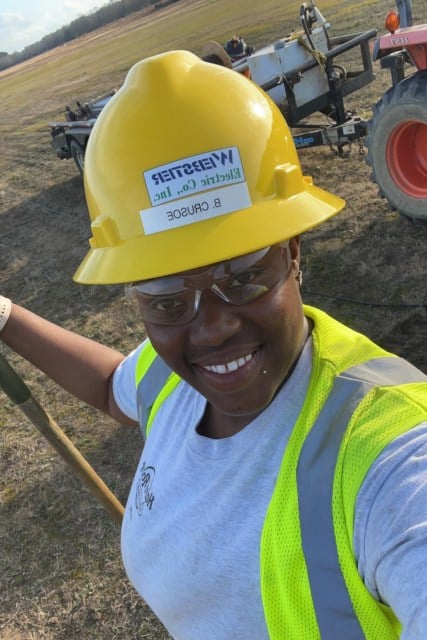When Hurricane Katrina hit the Gulf Coast on August 29, 2005, it wiped out the livelihoods of hundreds of thousands of people. But one industry thrived by necessity in the aftermath: demolition, debris removal and construction — the building trades in which men comprise 96 percent of the workforce. By contrast, women, who made up the majority of the tourism and hospitality services that were hit hardest by the storm, saw precipitous drops in employment.
Gender inequalities were amplified. Before the storm, many women — particularly Black women and single mothers — were trapped in low-wage jobs, and they didn’t have the necessary resources to get back on their feet post-Katrina. And with child care and school systems wiped out across the region, they also struggled to find a place to send their kids while they looked for work.
Carol Burnett, then-executive director of Moore Community House, a nonprofit in Biloxi, Mississippi, which provided child care to low-income women and single mothers, watched firsthand as this dynamic played out. Her own organization was nearly destroyed in the storm, and she immediately went to work securing funds to rebuild the free child care program, which was funded by Head Start.
Burnett saw a need for better employment opportunities for the single moms who relied on Head Start. In Biloxi alone, thousands of jobs were lost at the casinos and hotels that dot the shore. So when a D.C.-based nonprofit reached out to see whether she would be interested in hosting a job training to help women enter tradeswork, she jumped at the opportunity. After all, it wasn’t that there weren’t jobs, it was that they were all going to men.
With a small amount of initial funding, she launched the program and found projects in the neighborhood where the women could gain experience in construction and demolitions. Twenty percent of the city had been destroyed by the hurricane, and the houses surrounding Moore Community House were decimated.
The hands-on training came from just being there with these teams to help rebuild homes after Katrina.”
Carol Burnett, former executive director of Moore Community House
“We were involved in a coalition of nonprofits all pulling together to try to rebuild and recover,” Burnett said. “The hands-on training came from just being there with these teams to help rebuild homes after Katrina.”
In the nearly two decades since, the program has expanded and updated its curriculum to meet the needs of the industry. This year it graduated its 117th class and boasts a 70 percent employment rate for graduates in trades or related jobs.
“It’s a proven strategy for making a difference in the lives of single moms,” Burnett said.

(Liz Hafalia/San Francisco Chronicle/AP)
Despite its success, the program lost a crucial piece of funding this spring when Elon Musk’s so-called “Department of Government Efficiency” abruptly cancelled the two-year Women in Apprenticeship and Nontraditional Occupations (WANTO) grants, which support training women in construction trades. The reason given in letters to grant recipients was that the programs no longer aligned with the Department of Labor’s priorities, particularly as it relates to diversity, equity and inclusion.
The cancellation has imperiled the future of the program, which has provided a way for low-income women and single mothers — some of the most vulnerable to disasters due to poverty and their roles as caregivers — to achieve financial security.
Women like Brianna Crusoe.
In 2018, the single mom was struggling to make ends meet while raising two young children and working at a call center when a cousin told her about the women in construction program.
At 23, she was exhausted from working in customer service, something she’d done since she was 15. The call center didn’t pay well, wasn’t flexible with its scheduling, and she had to work weekends and nights.
With nothing to lose, she decided to enroll in the pre-apprenticeship program. The program paid for her two children’s child care and provided a weekly stipend, both of which made it possible for her to participate.
For eight weeks, she learned the ins and outs of the construction trades like workplace safety and how to use basic tools and equipment that might be found on a jobsite. She also learned about the benefits of working in the trades, including a $30 per hour salary — over double what she was making at the call center.
Bolstered by the experience, she applied for the International Brotherhood of Electrical Workers union apprenticeship, a multiyear training that would pay her while she learned the skills of the trade. To her surprise, she got in.
They literally guided me through every single step of the way.”
Brianna Crusoe
“It blew my mind, because I didn’t believe in myself at the time. But because I had all these credentials through women in construction, I was a high priority candidate on the list,” she said.
Because Moore Community House offered child care for a full year, she started the apprenticeship without having to worry about what to do with her kids, and she also was given money to buy textbooks, tools and personal protective equipment. The nonprofit also helped her prepare for her apprenticeship interview.

(Courtesy Brianna Crusoe)
“They literally guided me through every single step of the way,” she said.
Seven years later, she now works as a test electrician after being the only Black woman in her graduating class. She’s since moved into a two-story home in a neighborhood with better schools for her children. “That has always been my goal, is to put them in a good educational school,” she said. And because she no longer has to work weekends, she can take vacations with her family.
“It changed my life tremendously,” she said. “I’m happy about going into work. I’m no longer stressed as far as doing my job.”
Branden Forshee, the current executive director of the nonprofit, said even for those women who don’t go on to work in the trades, the training they receive can open doors to better paying jobs. “Just having a forklift license makes a world of difference,” he said. The nonprofit also has partners in the shipbuilding industry, and with some of these basic certifications, women have an opportunity to break into that career, too.
Moving women into these better paying jobs addresses what’s known as occupational segregation, a term used to describe the disproportionate concentration of women and people of color in low-wage jobs.
There was no warning, there was no notice.”
Branden Forshee, , executive director of Moore Community House, on federal funding cuts
“These women are working; they’re just working a job that pays terrible wages and has no benefits and doesn’t have any flexibility,” Burnett said. “If they’ve got a kid, they can’t do anything if there’s a daycare problem because their employer will fire them.”
But what’s allowed women to make the leap is the fact that the program offers wrap-around services like child care and a weekly $100 stipend, something made possible after receiving a federal grant in 2017.
The abrupt cancellation of their grant came “out of nowhere. There was no warning, there was no notice,” Forshee said. The program stopped offering the child care benefit this year and cut the stipend in half. He said it’s made an immediate impact on who is able to take the class. They usually have between 20 to 25 students. There are just five participants in the current cohort.
“It’s never happened before,” he said. “There’s obviously the disappointment that comes with seeing a class that small and the frustration behind understanding the importance of those supportive services and not being able to provide them,” he said.
Crusoe said it was devastating to hear the news.

Support The 19th’s ambitious plans
As part of our three-year strategic plan, we’ll keep showing up in the way you’ve told us you need us to: as your relatable guide to an unequal nation. Your support will help drive our plan forward.
“Child care is a big necessity for us single mothers, and so them taking away that child care stipend is basically putting single mothers back at a standstill,” she said.
Moore Community House recently reapplied to the same grant that was cancelled in the hopes that they could once more depend on federal funds to continue offering some of these services.
Single mothers are disproportionately impacted by disasters, according to researchers. They are more likely to live in poverty, in public housing, and are often taking care of children and the elderly. All of these are factors which make it harder to recover from a natural disaster. Because the majority of disaster relief funding goes to property owners, they also miss out on assistance to rebuild their own lives when housing has been washed away.
“It’s gendered in a context of what was available pre-storm, and what was available during those three years of really intense recovery,” said Pamela Jenkins, a retired professor of sociology who authored numerous academic papers on post-Katrina recovery.
For marginalized women, the storm only made their lives worse.”
Pamela Jenkins
“For marginalized women, the storm only made their lives worse,” she said. “Remember, most of these people … they worked two or three jobs just to get by. The restaurant jobs, the nursing jobs. All those jobs were gone,” she said.
But Jenkins, who lives in New Orleans, said women weren’t just victims of the storm, they were also the ones coming up with solutions. She met many women through her research who, like Burnett, were working on the community level to plug the holes in social services that appeared after the storm.
They spearheaded efforts to bring child care back to the city, expanded homeless shelters for women and families and helped women flee domestic violence.
Now, 20 years after Hurricane Katrina made landfall, Jenkins fears that a lot of the progress made to address the needs of women after a natural disaster is evaporating under the Trump administration.
“One, the government is not going to respond the way that it did, even under [George W.] Bush,” she said. “And two, this kind of misogyny that’s being allowed across the country is going to influence how women are affected by the next storm,” she said.
This kind of misogyny that’s being allowed across the country is going to influence how women are affected by the next storm.”
Pamela Jenkins
The Federal Emergency Management Agency has lost thousands of employees since Donald Trump returned to office. On Monday, former and current agency staff wrote a letter to Congress titled, “the FEMA Katrina Declaration,” warning that a downsizing of the agency and shifting of responsibility to states could affect the country’s ability to respond to the next major disaster.
In the case of the women that Moore Community House works with, the grant cancellations mean less economic security before the next disaster hits.
“If you’re a single mom, stuck in a low wage job. How do you pay for recovery?” Forshee asked. “The work that we do is important because we provide a place for their kids to go while they participate in the training that puts them on a pathway to earning higher wages.”
“In the context of rebuilding, it helps them start to rebuild their own lives, but also help others in beginning to rebuild theirs.”
Great Job Jessica Kutz & the Team @ The 19th Source link for sharing this story.




